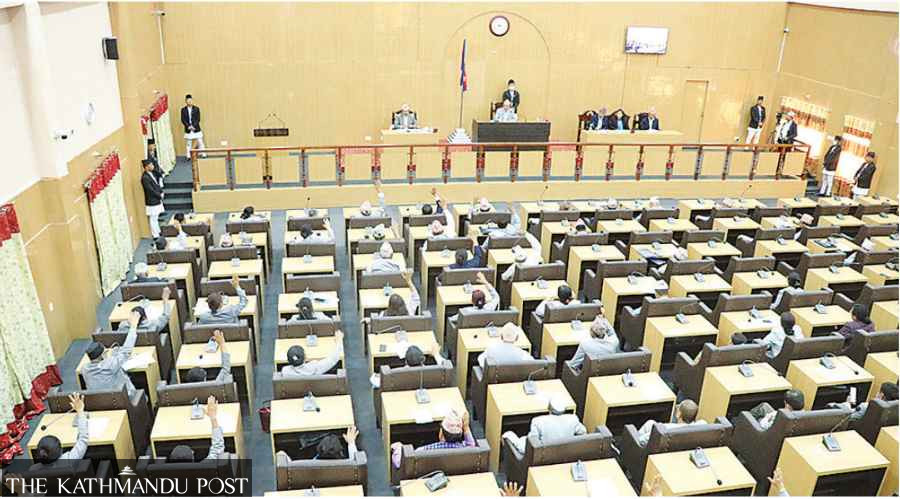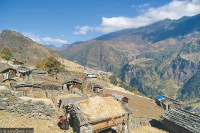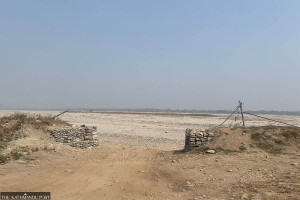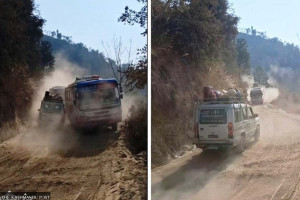Koshi Province
Province 1 struggles to get a name as assembly term nears expiry
With elections just months away, parties again renew efforts to name the province, only to end up bickering.
Tika R Pradhan
Of the seven provinces carved out after the constitution guaranteed Nepal as a federal republic, one in the east is yet to have a name—it is still known as Province 1 even as the five-year term of its first assembly is set to end.
The Provincial Assembly was mandated with the task of naming the province.
According to the constitution, a two-thirds majority of the provincial assembly should pass the name of the province.
Now as provincial elections are just months away, parties have once again renewed efforts to name the province, only to end up bickering.
The CPN-UML, the largest party in the Provincial Assembly, wants to name it “Koshi,” while the second largest Nepali Congress is in favour of “Saptakoshi”. And there are other parties that are batting for “Sagarmatha.”
And recently, groups of indigenous nationalities have joined the fray to demand a name that reflects the province’s ethnic identity. They have also launched demonstrations in Kathmandu, the federal capital.
Some of those organisations that are demanding a name that reflects the ethnic identity are indigenous wings of all major parties—Nepali Congress, CPN-UML, CPN (Maoist Centre), Janata Samajbadi Party and Sanghiya Loktantrik Rastriya Manch.
“Conspiracies are being hatched to name our province Koshi or Sagarmatha but we want it to be named Limbuwan-Kirat Province,” said Muksamahang Menyangbo, chair of Limbuwan Rastriya Mukti Morcha, which is close to the Maoist Centre.
And the current Chief Minister Rajendra Rai, who represents the CPN (Unified Socialist)—formed after the split in UML—is taking the lead to ensure the ethnic identity-based name to the province.
Many leaders blamed the previous government led by the Nepal Communist Party which had a two-thirds majority and could have easily named the province, for the prolonged indecision. However, UML leaders said there were complications then as the Maoists were for an ethnic-based name.
The Nepal Communist Party was a united force of the UML and the Maoist Centre. The party was invalidated in March last year.
“We are ready to take the share of the blame for failing to decide earlier but the previous government too had its own complications,” said Hikmat Karki, an assembly member from the UML who is currently entrusted by the party with the task of reaching a consensus with other parties on the name.
“But parties are sharply divided. Our concern is if we go for a name that reflects ethnicity it could open the pandora’s box, as similar demands could arise in other provinces which already have their names,” he said.
The assembly needs 60 members to endorse the name of the province as per the constitutional provision, something which is impossible unless parties agree on a particular name.
Article 295 (2) of the constitution states that the name of a province is set by a two-thirds majority of the total number of members of the provincial assembly concerned. Currently, in the 93-strong Provincial Assembly, there are 90 members with one Maoist Centre member defecting to the UML and two members resigning to contest local polls.
The UML has 39 members, the Congress has 21, the Maoist Centre has 15, the CPN (Unified Socialist) has 10 and the Janata Samajbadi Party has 3 members. The Samyukta Loktantrik Rastriya Manch and the Rastriya Prajatantra Party have one member each.
A few days ago, after receiving a memorandum from those who are demanding ‘Limbuwan-Kirat’ for the province’s name, Rai said there could be protests if ethnicity-based identity is not ensured while naming the province.
Rai, according to leaders, has been saying that he would rather dissolve the provincial assembly if the UML and Congress pushed for a geography-based name.
“We cannot go for a name that reflects geographical and ethnic identity,” said Karki.
Province 2 recently was named Madhesh after an agreement among the parties. Four other provinces have retained the erstwhile zone names—Bagmati, Gandaki, Lumbini and Karnali. The province in the far-west has retained the erstwhile development region name—Sudurpaschim.
On July 8, nine different political parties and organisations jointly organised a press meet in Kathmandu and warned that if their demand for ethnic-based identity is ignored, it could lead to protests by indigenous nationalities.
To seek consensus among the parties, major parties have given the responsibilities to their leaders.
Provincial Assembly member of the Congress Rajiv Koirala has been given the responsibility to hold dialogue with other parties and try to forge consensus while the UML has formed a committee led by its leader Karki.
On behalf of the ruling coalition, Health Minister Jayaram Yadav, who is also a leader of the Janata Samajbadi’s Parliamentary Party, has been assigned the responsibility to hold dialogue with other parties to arrive at consensus on a name for the province.
“As of today, we have not been able to come to any conclusion,” Koirala told the Post. “Still we are trying to narrow down our differences.”
On Friday, Speaker Pradip Kumar Bhandari invited leaders of the parties represented in the assembly to discuss how to move ahead with naming the province.
The next meeting of the assembly has been scheduled for 1pm Sunday, which has been stalled since July 3. Some parties including Congress want the Speaker to start the process of naming the Province.
“If the process is started, parties will then feel pressure and try to come to a conclusion at the earliest,” said Koirala. “Or else, the ongoing protests could grow.”
Various indigenous groups have recently started taking to the streets demanding that the province must have an ethnic identity.
On Thursday demonstrations were held at Maitighar Mandala in Kathmandu and Biratnagar.
“We would be forced to launch a long-term protest if any other name that does not reflect the ethnic identity is chosen,” reads a statement of the nine groups that are in protest.
Some forces have even warned of an armed conflict if the ethnic identity is denied to Province 1.
Gopal Kirati, who leads another Maoist Communist Party, issuing a separate press statement on July 12, has said his party will launch a strong struggle if their demand is not met.
“We will be ready for a multi-ethnic name like Limbuwan-Kirat if all the parties agree to it,” Koirala, the Congress leader said. “But I don’t think parties will agree on it.”
The meeting of the political leaders called by Speaker Pradip Kumar Bhandari has decided to make maximum efforts to endorse the name of the province through the ongoing session of the assembly.
“We have decided to pass the name of the province through the ongoing session,” said Rai, the chief minister of the province, following the meeting. “For which we will make maximum efforts to have a common name.”




 9.7°C Kathmandu
9.7°C Kathmandu












